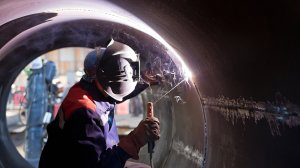Federation to host first assembly next year


AN AFRICAN APPROACH The African Welding Federation aims to increase international certified welding training across Africa
The first African Welding Federation Annual Assembly and Conference will be held in March 2023, in Egypt.
The aim is to focus on different welding processes and, held from March 14 to 17 at the Pyramidal Hotel in Cairo, the event will mark the first in-person meeting of the member countries.
The federation includes member countries such as Nigeria, Egypt, South Africa, Ethiopia, Uganda, Namibia, Morocco, Libya, Cameroon, Kenya and Ghana.
The conference is jointly organised by research institute Central Metallurgical Research and Development Institute (CMRDI) and the British University in Egypt.
The conference will cover basic and applied research in the field of Materials, Joining, Welding, Manufacturing, Inspection, Quality Assurance, Failure Analysis, Fracture Mechanics, Preventive and Emergency Maintenance, and Modelling and Computer Programs with the objective of improving the safety and performance of engineering structures and components.
The African Welding Federation is another avenue for the Southern African Institute of Welding (SAIW) to assist and increase international certified welding training across Africa.
The SAIW aims to assist African countries in establishing approved training bodies (ATBs) and authorised nominated bodies (ANBs) that are recognised by international scientific and engineering body the International Institute of Welding (IIW).
SAIW executive director John Tarboton says the federation aims to develop welding capabilities and work cooperatively to achieve common goals.
The federation also allows the SAIW to assist companies in member countries with certification, such as ISO 3834, owing to the service level agreement the institute has with the African Welding Federation.
Looking at its broader activities on the African continent, the SAIW works with African countries to develop their own training and certification programmes, suited to their requirements and capabilities.
Tarboton explains that the federation is developing some of its own qualifications and certification, such as Welding Inspector. However, ANBs –such as SAIW and the Nigerian Institute of Welding – will continue offering welding supervisors qualifications such as the International Welding Practitioner, or IWP; Specialist, or IWS; Technologist, or IWT; and Engineer, or IWE.
He says that the federation has prioritised development so that member countries can improve through skills development, thus ensuring that welding industries in member countries will be able to employ from a local skills pool.
Aligned with its goal of developing welding capabilities across Africa, the SAIW has applied for an extension of scope to work towards developing ATBs in countries without ANBs or ATBs.
SAIW Certification CEO Herman Potgieter explains that ATBs are beneficial, as they assist to develop the skills of lower skilled welders in Africa.
As a member of the IIW, the SAIW is the ANB for South Africa. Therefore, the institute can accredit ATBs, which can then offer training to meet the requirements of IIW qualifications, with the ANB issuing the qualifications.
For example, the SAIW assisted Nigeria in developing ATBs and the Nigerian Institute of Welding – which now serves as the ANB for Nigeria.
The institute has also developed ATBs in Uganda and Ethiopia and is aiming to develop ATBs in Liberia, Tanzania, Cameroon, Namibia, Mozambique, Rwanda, Egypt and Pakistan.
“Ethiopia is a great example of where we have been able to help the government’s vision of, firstly, developing welders and, secondly, to use these skills locally in manufacturing and construction to industrialise, develop and grow the Ethiopian economy,” says Tarboton.
In Ethiopia, the SAIW has trained 89 international welding practitioners, and 500 welders will qualify in the next 12 months through the SAIW, as the Welding, Training and Technology Centre – in Addis Ababa – is now an ATB.
Welding is an enabling technology, says Tarboton. Welding as a skill is needed to maintain existing plants and equipment, and for new construction projects.
Historically, Africa has imported a lot of these skills; therefore, it is important that African countries develop welding skills to become more self-sufficient and create employment, he concludes.
Article Enquiry
Email Article
Save Article
Feedback
To advertise email advertising@creamermedia.co.za or click here
Announcements
What's On
Subscribe to improve your user experience...
Option 1 (equivalent of R125 a month):
Receive a weekly copy of Creamer Media's Engineering News & Mining Weekly magazine
(print copy for those in South Africa and e-magazine for those outside of South Africa)
Receive daily email newsletters
Access to full search results
Access archive of magazine back copies
Access to Projects in Progress
Access to ONE Research Report of your choice in PDF format
Option 2 (equivalent of R375 a month):
All benefits from Option 1
PLUS
Access to Creamer Media's Research Channel Africa for ALL Research Reports, in PDF format, on various industrial and mining sectors
including Electricity; Water; Energy Transition; Hydrogen; Roads, Rail and Ports; Coal; Gold; Platinum; Battery Metals; etc.
Already a subscriber?
Forgotten your password?
Receive weekly copy of Creamer Media's Engineering News & Mining Weekly magazine (print copy for those in South Africa and e-magazine for those outside of South Africa)
➕
Recieve daily email newsletters
➕
Access to full search results
➕
Access archive of magazine back copies
➕
Access to Projects in Progress
➕
Access to ONE Research Report of your choice in PDF format
RESEARCH CHANNEL AFRICA
R4500 (equivalent of R375 a month)
SUBSCRIBEAll benefits from Option 1
➕
Access to Creamer Media's Research Channel Africa for ALL Research Reports on various industrial and mining sectors, in PDF format, including on:
Electricity
➕
Water
➕
Energy Transition
➕
Hydrogen
➕
Roads, Rail and Ports
➕
Coal
➕
Gold
➕
Platinum
➕
Battery Metals
➕
etc.
Receive all benefits from Option 1 or Option 2 delivered to numerous people at your company
➕
Multiple User names and Passwords for simultaneous log-ins
➕
Intranet integration access to all in your organisation
















